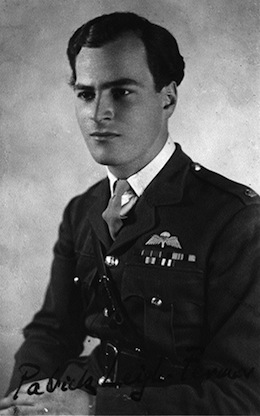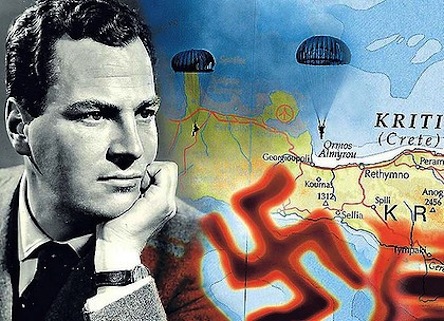 Caroline Lamb’s description of the English poet and adventurer Lord Byron applies in some respects to his modern counterpart, an Anglo-Irish writer and world traveler by the name of Patrick Leigh Fermor. Like Byron, “Paddy” spent most of his adult life outside England. Like Byron, he was particularly devoted to the cause of Greek freedom (in Byron’s case, fighting the Turks; in Fermor’s case,fighting the Nazis).
Caroline Lamb’s description of the English poet and adventurer Lord Byron applies in some respects to his modern counterpart, an Anglo-Irish writer and world traveler by the name of Patrick Leigh Fermor. Like Byron, “Paddy” spent most of his adult life outside England. Like Byron, he was particularly devoted to the cause of Greek freedom (in Byron’s case, fighting the Turks; in Fermor’s case,fighting the Nazis).
Paddy got kicked out of school at age seventeen and, after a few months on the party circuit (“The Bright Young Things” of London in the 1920’s), he decided to strike out on his own as a writer. To gather material Fermor set off from Holland in 1933 on foot and over the next year walked all the way across Europe to Istanbul. He witnessed the rise of Nazism in Munich. He saw firsthand the political and social chaos resulting from the collapse of the Austro-Hungarian empire. He made numerous friends along the way, ranging from farmers and bargemen to intellectuals and aristocrats. In fact, he ended up living with a Romanian countess, an idyll that only ended with the coming of World War II.
Above all else, Fermor developed an insatiable appetite to learn about the people, places, and cultures he encountered, most, if not all, of which were obliterated by the conflagration which followed. If it wasn’t for his acute powers of observation and ability to take it all down and organize it into a coherent history, much of the rich heritage of Eastern Europe would be lost to us.
 During the war, Paddy joined the Irish Guards but the traditional spit-and-polish discipline of that elite unit did not suit his free spirit. Following questionable “military logic” (an oxymoron if there ever was one), the powers-that-be decided that since he’d studied Ancient Greek in school, he’d be able to pick up modern, spoken, Greek. This actually turned out to be right. (Ultimately, he learned eight languages.)
During the war, Paddy joined the Irish Guards but the traditional spit-and-polish discipline of that elite unit did not suit his free spirit. Following questionable “military logic” (an oxymoron if there ever was one), the powers-that-be decided that since he’d studied Ancient Greek in school, he’d be able to pick up modern, spoken, Greek. This actually turned out to be right. (Ultimately, he learned eight languages.)
After the British army was defeated in 1941 by the Germans on the island of Crete, in history’s first airborne invasion, Paddy stayed on with a handful of colleagues to organize the resistance. Working with the locals was challenging, since they were split along lines of kinship, religion, and ideology. It also meant being on the run since the German occupiers were intent on crushing the insurgency and employed harsh techniques against anyone who defied them.
Paddy came up with a brilliant scheme of what is now called asymmetrical warfare. He concocted and carried out a scheme to kidnap the German Commandant and smuggle him off the island and to British held Egypt.
He and a colleague, Billy Moss, his friend, dressed up as German officers and stopped General Heinrich Kreipe’s car at a roadblock. Knocking out the general’s driver, they held Kreipe at gun point as they bluffed their way past a series of German checkpoints. They then had to escape over a mountain range in order to rendezvous with the British sub that would take them to safety.
As they were forcing their German captive to make this arduous trek, pursued by the entire Nazi garrison, they stopped just short of the summit of a mountain. Kreipe, looking up at the peak gleaming with snow, quoted a few lines in Latin from an ode by the Roman poet Horace, only to have Paddy complete the rest of the ode, also in Latin. Even mortal enemies can share a cultural heritage!
Paddy and his comrades got their prisoner away to Egypt and scored a tremendous propaganda victory. They spent the rest of the war working to drive the Axis (Italians and Germans) out of Crete and from the rest of the Greek Islands and mainland.
After the war, Fermor launched into an incredible literary career. He ranged throughout the world, including the Caribbean, Africa, and the Middle East, writing his own unique blend of history and travel books.
Much of the time he was a bachelor and he had an active social life, to say the least. He also met and knew everyone in the English speaking world of literary and political prominence. Like Shakespeare’s roistering Falstaff, many nights he heard “the chimes at midnight.” To say he had charm and energy-swimming the Hellespont at 70 –is an understatement.
He leaves behind 10 books and innumerable magazine articles and essays. His wartime exploits were made into the 1950’s movie with Dirk Bogarde (playing Paddy) “Ill Met By Moonlight.” (Another Shakespeare echo, this time from “The Tempest”). Last month I got to meet the author of Fermor’s biography, ‘Patrick Leigh Fermor—An Adventure’, a woman named Artemis Cooper. Her grandparents were good friends of his and so she had access to the inner Paddy. Cooper writes with fondness of her subject but with a candid and knowing perspective. Sometimes the private person is even more interesting than a carefully crafted public persona, however outwardly fascinating. Paddy, who died two years ago at age ninety-five, was such a man.











Splendid Sutherland, flawless.
I will buy the book.
Unless this guy called someone at KU a gayhawk or sold drugs with Glazer, I’m not sure that this is appropriate for this site.
Great read. Good job, Sutherland! Color me intrigued.
Did it mention that this dude used to suck down 80 TO 100 LUNG DARTS A DAY and still made it to 95? That is a guy you do not want to f*ck with. Even Glazer would have been scared to meet this guy in Westport.
I’m sorry, I don’t see the required Kansas connection.
The person who introduced me to biographer Cooper I met through a mutual friend from the Command & General Staff School at Ft. Leavenworth,Kansas. Cooper’s grandmother was a famous actress in the ’20s and closed a triumphal American tour with an extended run of the play in which she starred in KC.In her memoirs, Diana Cooper said the drinking,carousing,and general shenanigans here were actually wilder than in New York or Hollywood(maybe thanks to the wide open nature of Kansas City nightlife under Boss Pendergast!).She said it was her favorite city for that reason and also ,no doubt, because of the friendships she made and the rapturous response to her play The head of the KC Mo. Public Library also asked me to talk to to Fermor’s biographer about speaking here and to see if her husband, a noted military historian,might also come to speak,which she said they both would like to do. This is a pretty good set of connections to Kansas and Missouri. I also was not aware of any statutory or constitutional requirement that subjects of posts on KCConfidential had to have an exclusively Mo-Kan focus. Very few movies would thus qualify for Jack P’s reviews under that stricture and I don’t think anybody wants that.
The “required” kansas connection is the columnist.
First of all,’there is no requirement. Secondly, how about giving it up for one of kansas city’s finest writers.
Go Dwight!
Indeed. Outstanding. how many other blogs around here make you more literate after you’ve read them. Superb job, Dwight.
Agreed. Dwight certainly raises the bar.
There is always a ‘kansas requirement’ on this site and many other kc area sites.